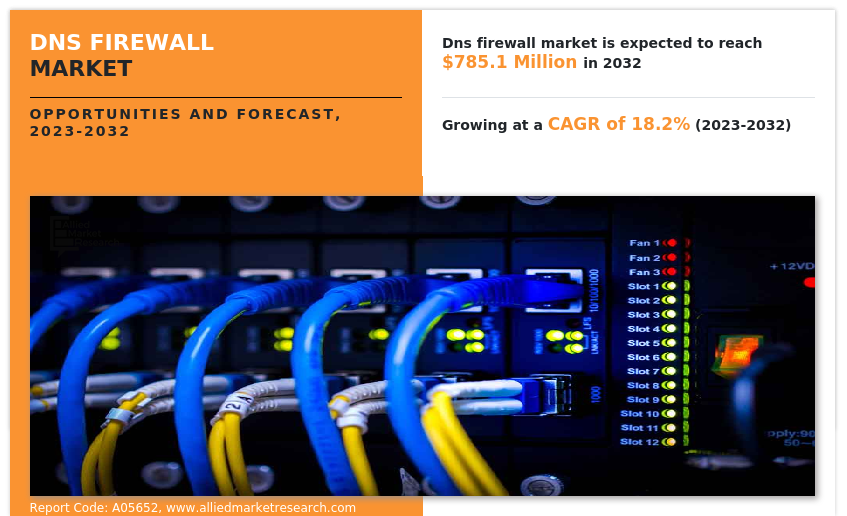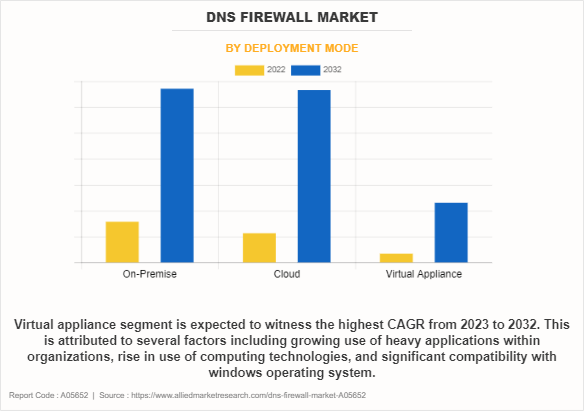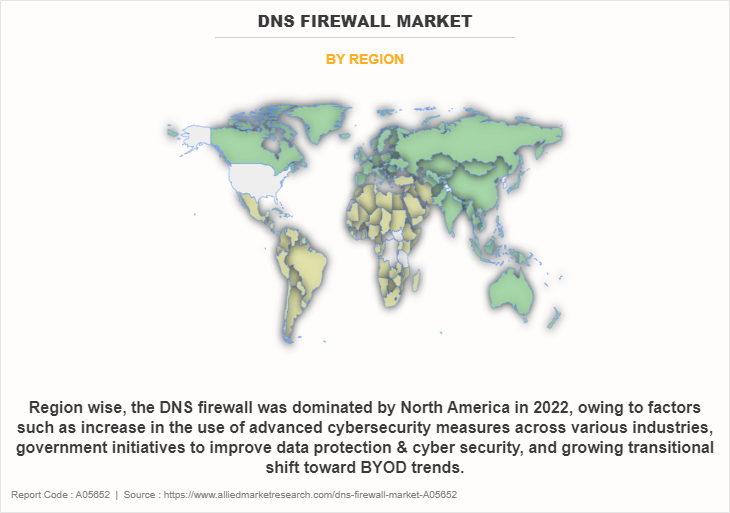DNS Firewall Market Overview
The global dns firewall market was valued at USD 151.6 million in 2022, and is projected to reach USD 785.1 million by 2032, growing at a CAGR of 18.2% from 2023 to 2032.
The domain name system (DNS) firewall is the network security solution that facilitates the network users and providers to take prevention from connecting to the malicious internet location. It enables to prevent data exfiltration by employing security threat intelligence and DNS Response Policy Zones (RPZs). DNS firewall can help data-sensitive enterprises to stop devices that are connected to a hybrid infrastructure, from attempting outbound connections and also prevent data exfiltration.

The key factors that drive the growth of the domain name system firewall market include increase in cyber security threats and increase in virtualization in the IT sector and BYOD policies. The rising sophistication of cyber threats, including zero-day exploits and advanced persistent threats, requires innovative defense mechanisms. DNS firewalls offer an additional layer of protection by filtering out malicious DNS traffic before it reaches the network, thereby preventing attacks at an early stage. In addition, the adoption of the zero-trust security model, which assumes zero trust in both external and internal network traffic, has gained momentum as a proactive cybersecurity strategy. Furthermore, growing penetration of smartphones coupled with utilization of web applications is considered an important factor to boost the DNS firewall market.
However, high installation and configuration price of DNS firewalls is expected to hamper the market growth. Hardware firewalls are more expensive than software firewalls as they require costly installation and maintenance. Moreover, DNS firewall solutions involve purchasing specialized hardware appliances or software licenses, both of which can be expensive. Smaller businesses, in particular, find it challenging to allocate funds for these upfront costs.
However, rapid increase in cloud-based DNS firewalls is expected to contribute to the growth of the DNS firewall market during the forecast period. The implementation of cloud-based DNS firewalls allows for flexibility in accommodating the changing requirements of cloud-based applications and services. This scalability ensures that organizations can adapt to changing traffic patterns and handle sudden spikes in DNS queries without the need for significant hardware investments.
The report focuses on growth prospects, restraints, and trends of the DNS firewall market analysis. The study provides Porter’s five forces analysis to understand the impact of various factors, such as bargaining power of suppliers, competitive intensity of competitors, threat of new entrants, threat of substitutes, and bargaining power of buyers, on the DNS firewall market.
Segment Overview
The DNS firewall market is segmented on the basis of deployment mode, end users, industry vertical, and region. On the basis of deployment mode, the market is categorized into on-premise, cloud, and virtual appliance. On the basis of end users, the market is divided into DNS providers, domain name registrars, enterprises, website hosts, and service providers. On the basis of industry vertical, it is divided into BFSI, telecom and IT, media and entertainment, retail and e-commerce, healthcare, government, education, and others. Region-wise, the market is analyzed across North America, Europe, Asia-Pacific, and LAMEA.

On the basis of deployment mode, the virtual appliance segment attained the highest DNS firewall market size in 2022. This is attributed to several factors including growing use of heavy applications within organisations, rise in use of computing technologies, and significant compatibility with windows operating system. Adoption of virtual appliances help to turn business work operations more flexible and efficient, by creating mobile work force, reduce development cots as well as virtualize work environments.

On the basis of region, North America held the highest DNS firewall market share in 2022, owing to factors such as increase in the use of advanced cybersecurity measures across various industries, government initiatives to improve data protection & cyber security, and growing transitional shift toward BYOD trends.
Key Market Players
The report analyzes the profiles of key players operating in the DNS firewall market such as IBM, EfficientIP, Comodo Group Inc., Allied Telesis Inc., Digicert, Inc., Cisco Systems Inc., BlueCat Networks, Cloudflare, Inc., F5, Inc., and Infoblox. These players have adopted various strategies to increase their market penetration and strengthen their position in the DNS firewall industry.
Top Impacting Factors
Increase in Cyber Security Threats
The rising sophistication of cyber threats, including zero-day exploits and advanced persistent threats, requires innovative defense mechanisms. DNS firewalls offer an additional layer of protection by filtering out malicious DNS traffic before it reaches the network, thereby preventing attacks at an early stage. In addition, adoption of the zero-trust security model, which assumes zero trust in both external and internal network traffic, has gained momentum as a proactive cybersecurity strategy. DNS firewalls are in perfect alignment with this model, as they continuously validate DNS traffic, irrespective of its origin; thereby safeguarding against insider threats and reinforcing the overall security posture.
Furthermore, rise in data security concerns within data-sensitive organizations can also be considered as a major driver for the growth of DNS firewall market. This growth is being driven by rise in data security risks within data-sensitive organizations and rise of security breach incidents leading to exposure of sensitive or confidential information. DNS firewall ensures end-to-end encryption, query resolution, strong protection against Distributed Denial-of-Service (DDoS) attacks via rate-limiting, and protection against unwanted downtime at the hands of cybercriminals. There is significant adoption of such tools across organizations. All these trends drive the growth of the DNS firewall industry.
Growing Penetration of Smartphones Coupled with Utilization of Web Applications
There has been a surge in mobile malware and phishing attacks targeting smartphone users, often exploiting DNS vulnerabilities. DNS is a common attack factor as the mobile application ecosystem, including e-commerce and financial transactions, flourishes. In addition, rise of remote work necessitates robust DNS security, as employees access corporate resources via mobile apps. Data privacy concerns are escalating, demanding stringent data protection measures, which DNS firewalls provide by preventing data exfiltration.
Moreover, as mobile users interact with web applications, their personal and sensitive data is at risk. Privacy concerns are mounting, necessitating stringent data protection measures. DNS firewalls play a critical role in safeguarding user data by preventing data exfiltration through malicious DNS queries. Furthermore, with the mobile app landscape expanding, organizations are deploying cloud-native DNS firewall solutions to secure mobile applications. These cloud-based solutions offer scalability and flexibility, making them well-suited for the dynamic nature of mobile app usage.
Increase in Virtualization in IT Sector and BYOD Policies
Virtualization technology enables organizations to run multiple virtual instances of servers, operating systems, and applications on a single physical server or hardware infrastructure. As virtualization has become a normal practice in the IT community, managing network traffic and security is strong. Virtualized environments demand advanced DNS security measures to protect against potential vulnerabilities and attacks. Moreover, DNS firewall solutions are increasingly designed to integrate seamlessly with virtualized infrastructures and accommodate the dynamic nature of BYOD scenarios. Scalability and flexibility are important factors, allowing organizations to adapt to changing IT environments and device management practices.
In addition, implementing a BYOD policy allows employees to use their own devices for work-related tasks, creating a more flexible and productive workforce. However, BYOD introduces new security challenges, as these devices can access the corporate network and its resources through DNS queries. Therefore, these factors are driving the DNS firewall market growth.
High Cost of Implementation
High installation and configuration price of DNS firewalls limits the growth of market, owing to the high cost of hardware components and an additional requirement of an IT professional for installation. Furthermore, hardware firewalls are more expensive than software firewalls as they require costly installation and maintenance. Moreover, DNS firewall solutions involve purchasing specialized hardware appliances or software licenses, both of which can be expensive. Smaller businesses, in particular, find it challenging to allocate funds for these upfront costs.
In addition, many organizations already have established IT infrastructure, including firewalls, intrusion detection systems, and network configurations. Integrating DNS firewalls into this existing environment require additional resources and expertise, adding complexity and cost to the deployment.
Cloud-based DNS Firewalls
Cloud-based DNS firewalls can dynamically scale to accommodate the evolving needs of cloud-hosted applications and services. This scalability ensures that organizations can adapt to changing traffic patterns and handle sudden spikes in DNS queries without the need for significant hardware investments. In addition, cloud-based DNS firewalls simplify management and administration, as organizations can configure and monitor This centralized management streamlines operations and reduces the administrative burden on IT teams.
Furthermore, cloud-based DNS firewalls can seamlessly integrate with other cloud security services, such as web application firewalls (WAFs) and cloud access security brokers (CASBs). This integration enhances overall security posture by offering a comprehensive defense against threats targeting cloud environments. Thus, these trends are likely to provide lucrative opportunities for DNS firewall market.
Integration with Ecosystems
Integrating DNS with orchestration and automation tools enables organizations to respond rapidly to security events. When a DNS-based threat is detected, automated actions can be triggered, such as isolating affected devices or updating firewall rules. This automation reduces response times and minimizes human error. Moreover, the cybersecurity landscape is ever-changing. Integration-ready DNS solutions are adaptable to incorporate emerging technologies and stay effective against evolving threats. Organizations are seeking solutions that can evolve with their security requirements, offering long-term value. Furthermore, as the cybersecurity landscape continues to evolve, integration-ready DNS solutions are primed to meet the dynamic security needs of modern businesses and seize lucrative market opportunities.
Market Landscape and Trends
The adoption of the zero-trust security model influences the DNS firewall market. Zero-trust emphasizes the need to verify everything trying to connect to a network, and DNS plays a crucial role in this model. DNS firewalls are used to ensure that only trusted entities gain access to the network. Moreover, AI and machine learning technologies are being integrated into DNS firewall solutions. This technology enables DNS firewalls to analyse network traffic patterns and detect anomalies or suspicious activity in real time. This proactive approach to security is becoming increasingly essential in the modern threat landscape.
In addition, massive data breaches made headlines, causing significant financial and reputational damage for businesses. DNS firewalls help prevent data breaches by accessing malicious domains and IP addresses, making them important data protection mechanisms and are also expected to speed up the deployment of 5G networks on in the coming years. With higher data speeds and low latency, 5G networks will enable more devices to connect, increasing the need for DNS firewall protection to safeguard these connections.
Key Benefits for Stakeholders
This report provides a quantitative analysis of the market segments, current trends, estimations, and dynamics of the DNS firewall market forecast from 2022 to 2032 to identify the prevailing market opportunities.
Market research is offered along with information related to key drivers, restraints, and opportunities of DNS firewall market outlook.
Porter's five forces analysis highlights the potency of buyers and suppliers to enable stakeholders to make profit-oriented business decisions and strengthen their supplier-buyer network.
In-depth analysis of the DNS firewall market segmentation assists in determining the prevailing DNS firewall market opportunity.
Major countries in each region are mapped according to their revenue contribution to the global market.
Market player positioning facilitates benchmarking and provides a clear understanding of the present position of the market players.
The report includes an analysis of the regional as well as global DNS firewall market trends, key players, market segments, application areas, and market growth strategies.
DNS Firewall Market Report Highlights
| Aspects | Details |
| Market Size By 2032 | USD 785.1 million |
| Growth Rate | CAGR of 18.2% |
| Forecast period | 2022 - 2032 |
| Report Pages | 289 |
| By Deployment Mode |
|
| By End User |
|
| By Industry Vertical |
|
| By Region |
|
| Key Market Players | Infoblox, IBM Corporation, Efficientip, Digicert, Inc., Allied Telesis Inc., Cloudflare, Inc., Cisco Systems, Inc., Comodo Group Inc., BlueCat Networks, F5, Inc. |
Analyst Review
With the proliferation of Internet of Things (IoT) devices, there is a growing need for DNS firewalls to secure IoT networks. DNS firewalls can help protect these devices from being compromised and used as entry points for cyberattacks. In addition, the COVID-19 pandemic accelerated the adoption of remote work and bring-your-own-device (BYOD) policies. With a dispersed workforce and a diverse range of devices connecting to corporate networks, DNS firewalls have become essential in ensuring network security and data protection. Furthermore, organizations and IT professionals are becoming more aware of the importance of DNS security. Training and educational initiatives have contributed to increased knowledge about DNS firewall solutions and their benefits. Moreover, growing implementation of hybrid work culture is creating significant opportunities for the future growth of the DNS security software market players.
The CXOs further added that market players are adopting strategies such as collaboration for enhancing their services in the market and improving customer satisfaction. For instance, in April 2023, Inflobox collaborated with Interval Leisure Group (ILG), a leading global provider of non-traditional lodging, encompassing a portfolio of travel, leisure, membership, exchange, resort management, and rental businesses to assist the group to streamline security and IP address management. The ILG network team problems will be addressed by Infoblox DDI, which unifies DNS, DHCP, and IP address management through a single user interface and a shared database. Automated IPAM could also significantly speed up the security team's process of analyzing malware. Therefore, such strategies boost the growth of the DNS firewall market.
Moreover, some of the key players profiled in the report are IBM, EfficientIP, Comodo Group Inc., Allied Telesis Inc., Digicert, Inc., Cisco Systems Inc., BlueCat Networks, Cloudflare, Inc., F5, Inc., and Infoblox. These players have adopted various strategies to increase their market penetration and strengthen their position in the industry.
The DNS firewall market is estimated to grow at a CAGR of 18.2% from 2023 to 2032.
The DNS firewall market is projected to reach $0.78 billion by 2032.
Increase in cyber security threats, growing penetration of smartphones coupled with utilization of web applications, and increase in virtualization in IT sector and BYOD policies majorly contribute toward the growth of the market.
The key players profiled in the report include DNS firewall market analysis includes top companies operating in the market such as IBM, EfficientIP, Comodo Group Inc., Allied Telesis Inc., Digicert, Inc., Cisco Systems Inc., BlueCat Networks, Cloudflare, Inc., F5, Inc., and Infoblox.
The key growth strategies of DNS firewall players include product portfolio expansion, mergers & acquisitions, agreements, geographical expansion, and collaborations.
Loading Table Of Content...
Loading Research Methodology...



